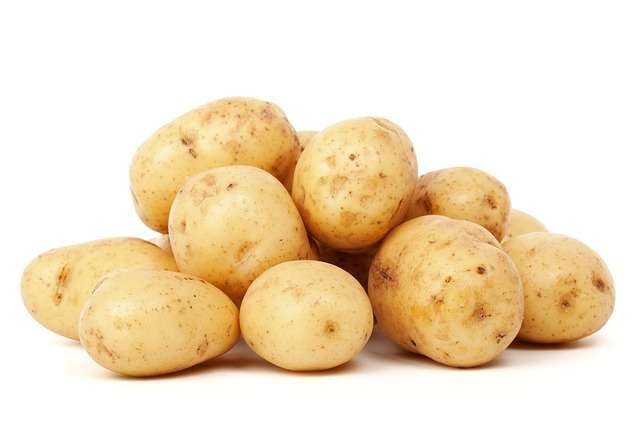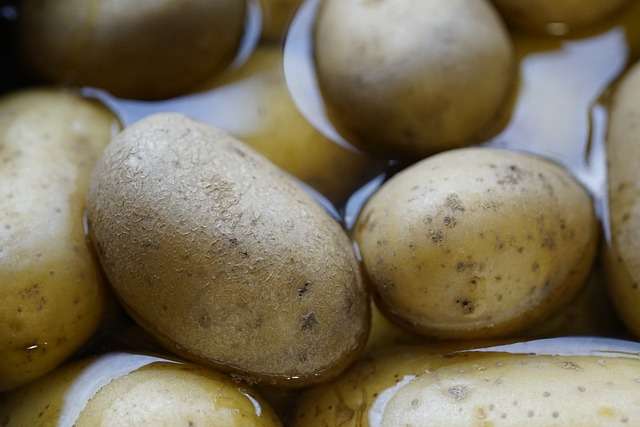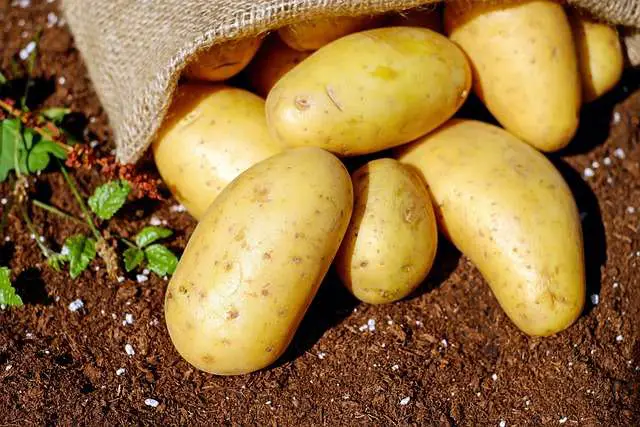Introduction:
A ubiquitous diet throughout much of the world is the starchy subterranean tuber known as the potato which explains the nutrition facts of potatoes. It belongs to the Solanaceae genus of plants, which also contains tomatoes, peppers, and eggplants.
One of the most popular vegetables in the world, potatoes can be found in a range of sizes, hues, and hue combinations, including white, red, yellow, and purple. The many methods by which potatoes can be cooked include boiling, frying, baking, mashing, and roasting.

They can be found in mashed potatoes, French fries, potato salad, and potato pancakes, among other meals.
In addition to being a significant source of minerals including vitamin C, potassium, and dietary fiber, potatoes are also a wonderful supply of carbs, particularly starch.
They have long been a significant source of food in numerous cultures, and they still have a significant place in the global modern diet.

Nutrition Facts of Potato:
The vegetable potato is a good source of many necessary elements. A summary of the nutrition facts of potato of a medium-sized (about 150 grams) roasted potato with skin is provided below:
Calories: A medium baked potato has approximately 161 calories, making it a meal that is low in calories.
Carbohydrates: The majority of potatoes’ carbohydrates come from them. The majority of the 37 grams of carbs in a medium potato—starch, which serves as a rapid source of energy—come from this food.
Dietary fiber: A medium-sized baked potato has roughly 4 grams of dietary fiber. Fiber is good for digestive health and it can control blood sugar.
Protein: A medium-sized baked potato typically contains 3.6 grams of protein, which is a small quantity.
They can add to your overall protein consumption even if they are not a significant source of protein.
Vitamin C: One medium-sized potato contains about 20 milligrams of vitamin C, which is roughly 30% of the daily required allowance. Potatoes are a good source of this vitamin.

The immune system and the formation of collagen both depend on vitamin C.
Vitamin B6: One medium potato has about 0.5 milligrams of vitamin B6, which is about 25% of the daily recommended allowance.
The metabolism and mental health are both significantly impacted by vitamin B6.
Potassium: A medium-sized potato has 610 mg of potassium, which is a relatively large amount. Maintaining good blood pressure and cardiac function requires potassium.
Iron: A medium-sized potato has 0.8 mg of iron, which is a negligible amount. For the blood to deliver oxygen, iron is necessary.
Magnesium: A medium-sized potato contains roughly 26 milligrams of this mineral, which supports a number of bodily processes, including the health of muscles and nerves.
Additional Nutrients: Potatoes also provide trace levels of additional vitamins and minerals, including folate, niacin, phosphorus, and zinc.

Health Benefits of Potato:
When included in a balanced diet, potatoes have a variety of health advantages and nutritional facts of potato. Here are five advantages of potatoes for health:
-
Rich in Nutrients:
Potatoes are an excellent source of potassium, dietary fiber, vitamin C, and vitamin B6. These vitamins and minerals are crucial for maintaining general health.
For instance, potassium helps control blood pressure and supports heart health, while vitamin C is crucial for the immune system and skin health.
-
Dietary fiber:
When you eat potatoes with their skin on, they have high dietary fiber content. Fiber is beneficial for the digestive system and can aid with constipation. Additionally, it contributes to satiety, which lowers calorie intake and aids in weight management.
-
Low in fat:
Because they are naturally low in fat, potatoes are a good option for people trying to cut back on their intake of fat.
However, it’s critical to pay attention to the preparation of the potatoes because using too much butter, oil, or toppings can considerably raise the calorie and fat content.

-
Energy source:
Carbohydrates, particularly starch, are found in potatoes in high concentrations. The body’s primary fuel source is carbohydrates. For those who are physically active and athletes, eating potatoes can be a rapid and reliable source of energy.
-
Antioxidant qualities:
Potatoes have antioxidants that can help shield cells from oxidative damage, including vitamin C and certain phytochemicals. Antioxidants low chance of developing chronic illnesses and promote general health.
How to incorporate Potato in your diet:
When prepared and consumed healthfully, potatoes may be a varied and nourishing addition to your diet. You can incorporate potatoes into your diet in the following ways:
Baked potatoes: A quick and wholesome way to eat potatoes is to bake them. The potatoes should be scrubbed, forked, and baked in the oven until they are tender. T
hey can have a variety of healthful toppings including grated cheese, salsa, steaming veggies, Greek yogurt, or other toppings.
Boiling potatoes: It is another wholesome cooking technique. They can be boiled until soft and then used in salads, mashed with some low-fat milk or olive oil, or seasoned with herbs and spices.
Mashed potatoes: Instead of using butter and cream, add a healthy touch to traditional mashed potatoes by substituting low-fat milk or yogurt.
For taste, you can also include herbs, roasted garlic, and a little olive oil.
Roasted Potatoes: When potatoes are roasted in the oven with a splash of olive oil and your preferred seasonings, their natural flavors are enhanced.
For variety, mix in some finely chopped onions, bell peppers, or other veggies.
Potato Salad: To make potato salad, cook and cube potatoes. Then, add celery, onions, pickles, and a vinaigrette or light Greek yogurt dressing.
Hash Brown: Homemade hash browns can be made by mashing potatoes and cooking them in a nonstick pan with a little oil.
For added taste and nutrition, you can add veggies like bell peppers, onions, and spinach.
FAQs:
-
Is eating potatoes healthy?
Yes, when served without added fat, potatoes are a good source of fiber, vital nutrients like vitamin C, and carbs.
-
Is potato skin edible?
Yes, potato skin may be eaten and is a wonderful source of nutrients like dietary fiber and vitamins. Just be certain to fully wash it before utilizing.
-
Are ordinary and sweet potatoes the same thing?
No, sweet potatoes are a separate species from plain potatoes. The botanically unique sweet potato has an orange or purple flesh and a sweet flavor.
-
Do potatoes make you gain weight?
It’s doubtful that eating potatoes in moderation as part of a healthy diet will result in weight gain. However, cooking techniques and additional toppings may change the amount of calories in a dish.
-
Can someone with diabetes eat potatoes?
Yes, however in order to effectively control blood sugar levels, it’s crucial to keep an eye on portion sizes and opt for healthier cooking techniques.
Conclusion:
In conclusion, nutrition facts of potatoes are a flexible and nourishing vegetable that, when prepared and consumed wisely, can be an important component of a balanced diet.
They can be prepared in a variety of wholesome ways, such as baking, boiling, or roasting, and supply necessary nutrients, including carbohydrates, fiber, vitamins, and minerals.
To fully appreciate the nutritional advantages and nutrition facts of potatoes while preserving general health, it is crucial to pay attention to cooking techniques, portion sizes, and the moderation of bad fats and toppings.
